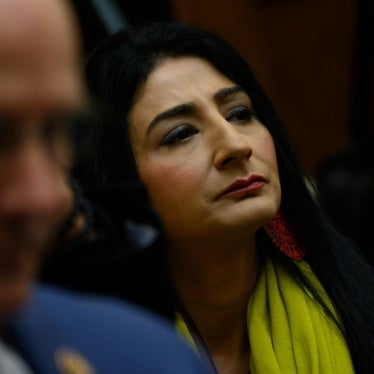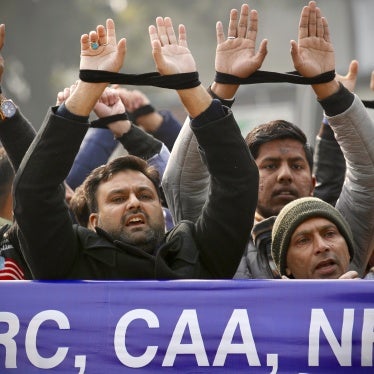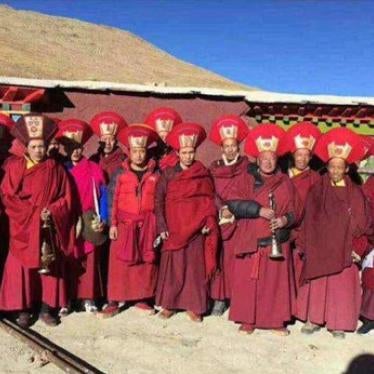Testimony of John Sifton, Asia Advocacy Director, Human Rights Watch
Thank you for inviting Human Rights Watch to testify. We are grateful for the opportunity to provide details on the worrying trajectory of India’s human rights situation.
Human Rights Watch is an independent, non-governmental organization that monitors and reports on human rights abuses by governments and non-state armed groups in about 100 countries around the world. This includes India, where we have done work for more than three decades, and the United States, where we have worked since our founding in 1978. To ensure our independence and impartiality we accept no government funding. We are non-partisan and do not endorse or oppose political parties or candidates in any country where we work.
The current human rights situation in India is immensely concerning.
In the 10 years since the election of Prime Minister Narendra Modi and his Hindu nationalist Bharatiya Janata Party (BJP), India’s government has accelerated a crackdown on civil society and the media and adopted an increasingly majoritarian form of governance that tramples on the rights of religious and ethnic minorities.
The authorities have prosecuted activists, journalists, and peaceful protesters on fabricated counterterrorism and hate speech laws. They have stifled civil society and human rights groups with pretextual investigations and prosecutions.
Authorities have also threatened diaspora critics and journalists with restrictions on their travel documents. An indictment of an Indian national in New York City in 2023, for allegedly attempting to hire an assassin to murder a Sikh Indian-American resident, echoes earlier accusations by the Canadian government about a similar plot in Canada.
The ruling BJP party has encouraged and supported local vigilante groups that employ hateful rhetoric and violence directed at religious minorities, including against Muslims, the minority Christian Kuki community in Manipur, and minority communities in several other parts of the country. In addition, BJP leaders, including elected officials, regularly vilify Muslims in speeches, and their hate speech or incitement have further increased vigilante violence.
Police complicity in violence, or dereliction in protection of victims, has also emboldened perpetrators. And in the wake of violent incidents, authorities typically focus on minority communities for legal enforcement or punish those that protest their discriminatory conduct by destroying their homes and property.
Security forces have also used excessive force and threats against farmers protesting about agricultural problems in Delhi and other locations, many of them Sikh. BJP party leaders have dangerously labeled the protesting farmers “separatists,” an accusation that increases their risk of suffering discrimination and violence.
In several areas facing unrest, authorities have shut down internet and communications platforms for long periods—actions that have imposed immense hardships on populations and made it difficult to document and communicate information about human rights abuses, especially during protests. Shutdowns hamper vital access to information and essential services like health care, banking and welfare services.
In the lead-up to India’s elections scheduled for April 2024, these problems have combined to create a perilous situation. Several actions and policies of the Indian government, in the lead up to the election, deserve particular attention.
In August 2019, the government revoked the constitutional status of Muslim-majority Jammu and Kashmir, splitting the region into two federally governed territories. To prevent protests in the wake of this decision, security forces arbitrarily detained hundreds of people, including journalists and human rights defenders, and imposed a total communications blackout, including on the internet, and severe restrictions on the rights to freedom of movement and peaceful assembly. The government intensified the crackdown in 2021 and 2022, including on media and civil society groups, frequently using India’s vague and overbroad counterterrorism laws.
Another issue concerns the site of the Babri Mosque in Ayodhya, a source of longstanding disputes between Hindus and Muslims and which has repeatedly led to incidents of violence. In December 1992, BJP supporters, encouraged by BJP leaders to march to the site, ended up destroying it, an event which then set off violence across India that killed thousands. In 2002, a prayer ceremony at the site led to another spate of violence, first when 59 Hindu pilgrims returning from Ayodhya to Gujarat were killed in a fire on their train that started during an attack by Muslims. In revenge attacks that followed across the state, mobs killed hundreds of Muslims and police did little to intervene. Modi was chief minister of Gujarat at that time, and the US government later revoked his visa to the US in connection with his role in the riots.
After being elected in 2014, the Modi government targeted human rights defenders who had documented his and other BJP leaders’ role in sparking violence in Gujarat, while publicly making the construction of a temple on the site a priority.
In January 2024, after Modi presided over a ceremony to inaugurate the temple, clashes broke out in several locations in India, including cases in which Hindu mobs attacked Muslims and their properties.
Also of concern is the government’s plan to move forward to create a National Register of Citizens: a process providing a basis for local officials to label persons’ citizenship as “doubtful” or otherwise challenge it, but which could set the stage for stripping people of their citizenship.
India’s new Citizenship Amendment Act of 2019 compounds fears that this NRC process could be used in a discriminatory and problematic way. The law specifically excludes Muslims from fast-track processing of people eligible for citizenship from Afghanistan, Bangladesh, and Pakistan. Indian officials in recent years have made numerous statements about Muslims from Bangladesh and Myanmar contending that they entered India illegally and are “infiltrators,” “migrants,” and “foreigners.”
These distinctions demonize Muslims. When the CAA and NRC processes were first floated five years ago, BJP leaders, including the Home Minister, were clear about its discriminatory intent. “Illegal immigrants are like termites and they are eating the food that should go to our poor and they are taking our jobs,” Home Minister Amit Shah said at a BJP election rally in September 2018. “They carry out blasts [bombings] in our country and so many of our people die.”
Combined with the Citizenship Amendment Act, the NRC process can create a system in which millions of Muslims could be rendered stateless—especially in border areas where their citizenship might be questioned by authorities. When the Citizenship Amendment Act was first enacted in December 2019, widespread protests broke out that led to over 50 deaths. Protesters specifically cited that NRC lists and voting rolls in the state of Assam, which borders Bangladesh, had been prepared in an arbitrary manner, rendering over a million people stateless, most of them Muslim.
Human Rights Watch and Amnesty International documented in Assam that in tribunals for deciding cases of “doubtful” citizenship, the burden of proof is placed upon individuals to prove their citizenship, and in a “process” that is arbitrary, discriminatory, inconsistent, and error-ridden. Tribunals are operated without uniform standards and are led, very poorly, by officials without any legal or judicial experience. Some individuals are expected to provide documentary evidence dating back over 50 years, a particularly difficult burden for more marginalized people, or those who had been repeatedly internally displaced because of common natural disasters such as floods, as well as outbreaks of violence.
* * * * *
India’s reputation as a rights-respecting pluralistic country is at risk so long as the government continues to be guided by these discriminatory, exclusionary, and intolerant approaches to governance, and elevates a particular religious group over the rest.
The United States and the rest of the world need to strongly communicate their concerns about these issues to the Modi government.
What can the US government do about the human rights situation in India?
Members of the US Congress should:
- Repeatedly and publicly raise concerns with the Indian government over the sustained attacks and vilification of Muslims and other religious minorities and call upon the Indian government to appropriately prosecute persons responsible for attacks. Members of Congress should also speak out privately and publicly against hate speech by government officials and urge Indian authorities to investigate and appropriately prosecute incitement to violence.
- Raise concerns with Indian authorities about India’s repeated long term internet blackouts, suspension of mobile internet services, and blocking online content on social media platforms. On several occasions, authorities have compelled X (formerly Twitter) to block accounts of journalists and government critics. Subsequently, X publicly raised concerns about the Indian government's arbitrary orders to block online content. Congress should as well.
- Urge India to implement long-pending police reforms without delay to ensure the police are free from political influence and are able to take effective action during communal violence and carry out impartial investigations to prosecute perpetrators.
- Urge the Indian government to discard plans for a nationwide National Register of Citizens and shelve implementation of the Citizenship Amendment Act. Congress should also call on the Indian government to repeal or amend other laws that discriminate against minorities or unfairly target nongovernmental organizations.
- And most importantly, forcefully urge President Biden to speak directly to Prime Minister Modi about the concerns raised today.
It is ultimately Prime Minister Modi who has the power to instruct his government and party to rein in their toxic rhetoric and abusive laws and policies, and embrace a more tolerant, less discriminatory, and less abusive mode of governance.
President Biden needs to acknowledge the scope and gravity of India’s deteriorating situation. His embrace of Modi, and reluctance to criticize his government for this worsening situation, will be understood in India to mean that Modi’s worsening conduct will have no consequences. This only contributes to the dire situation. By continuing to disregard the problems outlined today, while providing India with $4 billion in new sales of armed Reaper drones, the administration sends the terrible message that the US government cares more about Modi, as a leader, than about the people of India whom he was elected to serve.
To watch the entire hearing, see here: https://humanrightscommission.house.gov/events/hearings/india-recent-human-rights-reporting








